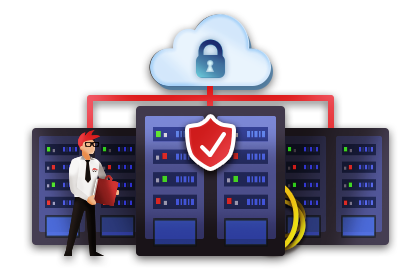Data is not just an asset; it’s the backbone of business operations, holding the power to dictate success or failure. As we approach World Backup Day, it’s crucial to shine a spotlight on a practice that many overlook until disaster strikes: data backup and testing, integral to your security strategy to prevent unauthorized access.
Imagine losing all your client information, financial records, or product data in an instant, possibly falling into the wrong hands. Sounds like a nightmare, right? Unfortunately, this scenario is all too common and can be a reality for anyone who neglects the importance of regular data backups and testing. With the rise in cyber threats, such as ransomware attacks and data breaches, safeguarding your data has never been more critical. Cloud backups offer a reliable solution for storing your data in a remote location, ensuring it’s protected against local disasters in cloud environments.
The truth is, simply backing up data isn’t enough. You need to implement both incremental and differential backups as part of your backup solution to efficiently manage storage space while ensuring that your most recent data changes are safeguarded against unauthorized access.
The Stark Reality of Data Loss
The digital age, while offering boundless opportunities for business growth and connectivity, also comes with its fair share of vulnerabilities. Data loss is a critical IT challenge that can stem from various sources: cyberattacks, human error, hardware failure, or natural disasters, often exacerbated by unauthorized users. The statistics paint a grim picture of the current landscape:
- 30% of people have never backed up their data, a startling figure that underscores a widespread complacency towards data protection.
- Data loss and downtime cost enterprises $1.7 trillion annually, highlighting the massive financial implications of not safeguarding digital assets against unauthorized access.
These incidents serve as a wake-up call, emphasizing the necessity for robust data backup strategies and security technologies to mitigate the risks of such catastrophic events.
Why Just Backing Up Is Not Enough
Merely having a backup does not guarantee a seamless recovery process. The efficacy of a backup system, including backup servers and storage space area networks (SANs), is only as good as its last successful test. Surprisingly, 23% of businesses never test their backups, and among those that do, 77% have encountered backup failures during recovery attempts due to malicious attacks.
The absence of regular testing can lead to a false sense of security. For example, a well-known financial institution experienced data corruption that went undetected for months because their backups were not routinely tested. When they finally needed to restore their data following a minor system failure, the backups were found to be unusable, resulting in significant data loss and operational downtime.
It is critically important to not only back up your data regularly, but also testing these backups to ensure they can be relied upon in an emergency. Testing verifies the integrity of the backup data and the effectiveness of the recovery process, ensuring that businesses can quickly bounce back from data loss incidents without significant disruptions or losses. Adopting security practices like multi-factor authentication can further protect against unauthorized access, aligning with regulatory requirements and privacy regulations.
Let’s move on to discussing an effective backup process and testing strategies, and how businesses can adopt these practices to protect themselves against data loss, especially in the context of digital transformation involving mobile devices.

How to Effectively Backup and Test Your Data
Adopting a comprehensive strategy for data backup and testing is crucial for any business looking to safeguard against data loss. Here are some best practices to ensure that your data is not only backed up but also recoverable when needed:
- Follow the 3-2-1 Backup Rule: This rule advises having at least three total copies of your data, two of which are local but on different devices (e.g., on your computer and an external hard drive), and one copy off-site (e.g., cloud storage). This strategy protects against various types of data loss scenarios and helps meet compliance standards.
- Regularly Schedule Backups: Consistency is key in backing up data. Automate your backups to occur at regular intervals, ensuring that you’re always protecting the most current data without relying on manual processes.
- Test Your Backups Routinely: Regular testing of your backups is essential to confirm that your data can be recovered. This should include full restores in a test environment to verify that the data is intact and the restore process is effective. Aim to conduct these tests at least quarterly, reinforcing your security policies.
- Monitor and Review Backup Processes: Continuously monitor your backup processes for failures or issues. Regular reviews can help identify trends, such as increasing backup sizes or longer backup times, which could indicate potential problems.
- Educate Your Team: Ensure that all team members understand the importance of backups and how to properly handle data. Human error is a common cause of data loss, so training and awareness are critical components of a successful backup strategy, including the enforcement of security policies and the use of multi-factor authentication.
Real-life Disaster Stories
These are just some cyber disaster incidents where businesses faced significant setbacks due to inadequate backup practices underscore the critical need for effective data protection strategies:
1. MGM Resorts International (September 2023)
This hospitality giant fell victim to a ransomware attack by the Scattered Spider group using ALPHV (BlackCat) ransomware. The attack disrupted operations for five days, causing an estimated loss of $80 million in revenue. The absence of effective incremental backups or the lack of testing differential backups likely extended the downtime and financial losses.
2. Real Estate Wealth Network (December 2023)
This incident involved a massive data breach where a researcher discovered an unprotected database containing property ownership information for millions of people. Over 1.5 billion records were exposed. The lack of basic security measures suggests the network might not have had a robust backup system in place, or the backups might not have been properly secured or tested, making them useless in recovering the sensitive data.
3. TaxAct (October 2023)
This incident involved a data breach at the tax preparation software company TaxAct. Hackers gained access to personal information of over 1.4 million customers, including names, Social Security numbers, addresses, and dates of birth. The company is still investigating the scope of the breach and how it happened, but it highlights the importance of data security in the financial services industry. While the details of backups haven’t been publicly released, the fact that the attackers were able to access so much sensitive data suggests that backups may have been compromised or unavailable.
These stories paint a vivid picture of the dire consequences that can follow from inadequate business continuity, data backup and testing practices. They serve as cautionary tales, emphasizing the importance of investing in comprehensive data protection strategies to safeguard against such disasters.
Here is another quick story about a business that was unprepared in testing their backups.
Find the Right Partner to Back You Up
For many small to medium-sized businesses, the complexity and resource requirements of managing sophisticated backup and disaster recovery solutions, including backup processes and servers, can be overwhelming. This is where partnering with a Managed Security Services Provider (MSSP) like Nerds Support can make a significant difference
MSSPs bring specialized knowledge and experience in managing comprehensive backup and disaster recovery solutions, ensuring that your data is protected by the latest best practices and technologies.
With a Managed Security Services Provider, your backups, especially those involving mobile devices and virtual machines, are not just automated but also continuously monitored and regularly tested. This proactive approach ensures any issues are identified and addressed promptly, minimizing the risk of backup failures.
Every business has unique needs and risks. An MSSP can provide customized backup and disaster recovery solutions tailored to your specific requirements, offering the best protection for your critical data.
Act Now, Not After the Disaster
World Backup Day is more than just a reminder to back up your data; it’s a call to action to adopt a comprehensive data protection strategy that includes regular backups and rigorous testing. The stories and statistics we’ve shared illustrate the dire consequences of neglecting these practices and the resilience that comes from being prepared.
As we emphasize the importance of backups and testing, we also highlight the value of partnering with an MSSP like Nerds Support. Our expertise can be the difference between a minor inconvenience and a catastrophic data loss event. Contact us today for a free security posture evaluation!
Don’t be a fool this World Backup Day; take the steps to ensure your data is protected and recoverable, no matter what challenges you may face!



